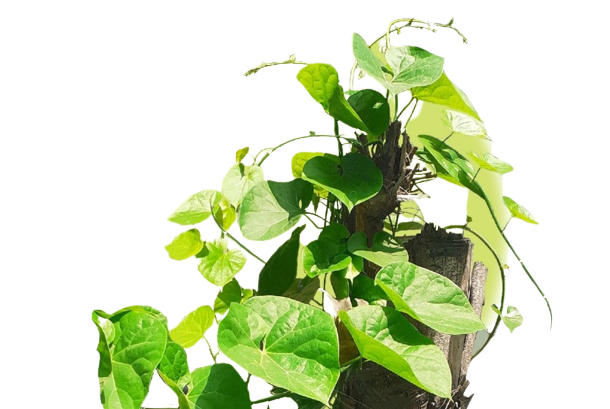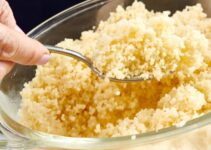Guduchi Introduction
Tinospora cordifolia is commonly known as Guduchi or Giloy. It is a miracle herb used to treat various diseases, including fever, jaundice, chronic diarrhoea, skin, eye, and metabolic and joint disorders. In Sanskrit, it is called Amrita, the ‘herb of immortality’, because of its numerous health and medicinal properties.
Guduchi is a deciduous climbing shrub that comes under the Menispermaceae family. It is one of the best Rasayana (Rejuvenator). It is a famous medicine known for its therapeutic applications.

Guduchi Properties
- It is associated with the properties of immune modulation and rejuvenation.
- Various biochemical and pharmaceutical compounds, such as alkaloids, diterpenoid lactones, glycosides, steroids, sesquiterpenoids, and phenolics, are found.
- These compounds have pharmacological properties such as anti-diabetic, antipyretic, anti-inflammatory, antioxidant, hepato-protective, and immuno-modulatory.
- It is also attributed with anti-toxic, anti-infective, anti-arthritic, anti-osteoporotic, anti-diabetic and Anti-microbial.
Guduchi in classical texts
The plant has been narrated by different names in different classical literature.
- Charaka Samhita: Vayahsthapana
- Sushruta Samhita: Guduchyadi
- Ashtanga Samgraha: Aragvadhadi
- Dhanvantari Nighantu: Guduchyadi varga
- Shodhal Nighantu: Guduchyadi varga
- Madhava Dravyaguna: Shaka varga
- Madanpala Nighantu: Abhayadi varga
- Raja Nighantu:Guduchyadi varga
- Kaiyadev Nighantu: Aushadhi varga
- Bhavaprakasha Nighantu: Guduchyadi varga
- Saraswati Nighantu: Latadi varga
- Shaligrama Nighantu:Guduchyadi varga
- Haritakyadi Nighantu:Shaka varga
- Priya Nighantu: Pippalyadi varga
Different names
- English: Tinospora cordifolia
- Assamese – Siddhilata, Amarlata
- Bengali – Gulancha
- Gujarati – Galac, Garo
- Hindi – Giloy, Gurcha
- Kannada – Amrutaballi
- Kashmiri – Amrita, Gilo
- Malayalam – Chittamrutu
- Marathi – Gulvel
- Oriya – Guluchi
- Punjabi – Gilo
- Tamil – Seendal, Seendil kodi
- Telugu – Thippateega
- Urdu – Gilo
Tinospora Species
- T. arfakinsa
- baenzigeri
- barkis
- celebica
- cordifolia
- crispa
- dentate
- dissitiflora
- esiangkara
- formani
- fragosa
- glabra
- glandulosa
- guangxiensis
- hainanensis
- hirsute
- homosepala
- macrocarpa
- maqsoodiana
- merriliana
- neocaledonica
- nudiflora
- orophila
- palminervis
- sagittata
- siamensis
- sinensis
- smilacina
- subcordata
- sumatrana
- teijsmannii
- tenara
- tinisporoides
- trilobat
Therapeutic uses
- Juice of Guduchi and Shatavari in equal proportion along with jaggery helps to reduce fever caused by Vata.
- Decoction of Triphala (Terminalia chebula, Terminalia bellerica and Emblica officinalis) and Guduchi juice is helpful for irregular fever.
- Ghrita (Medicated ghee) and oil (Medicinal oil) prepared with juice and paste of Guduchi, Triphala, Vasa (Justicia adhatoda L), Draksha (Vitis vinifera L.), and Bala (Sida cordifolia L.) alleviate chronic fever.
- In case of jaundice and hepatitis, one should take buffalo’s ghee processed with Guduchi juice and milk.
- Decoction of Guduchi, Triphala, Nimba and Patola mixed with honey and sugar prevents vomiting and hyperacidity (Amplapitta).
- Decoction of Guduchi, Nimba, and Patola leaves mixed with honey should be given to those suffering from Amlapitta (hyperacidity).
- Guduchi is the best remedy for managing gout if its decoction is processed in Ghrita or Milk.
- Guduchi, along with the Shunthi, is beneficial in the treatment of rheumatism
Dosages
- 3-6 g of Giloy in powdered form and specified adjuvants.
- 20-30 g of coarse powder is used to prepare the decoction.
- 125 mg – 1000 mg of Guduchi satva and specified adjuvants.
Guduchi benefits
- It helps to make your immune system stronger.
- It is beneficial for skin diseases when Giloy is taken with ghee on an empty stomach in the morning.
- It cures gastrointestinal disorders due to the effect of bacteriostatic.
- It energies the liver and increases its longevity.
- The extracts of the stem of Tinospora cordifolia have anti-stress activity.
- It is beneficial in glucose tolerance and adrenaline-induced Hyperglycaemia.
- Its extract and decoction are helpful in the management of gout.
- Show good impacts on the function of cardiac conditions.
Importance
The genus Tinospora includes 34 species; 9, phytochemical investigations, pharmacological experiments, and clinical applications have mainly focused on four species of Tinospora, viz.T. cordifolia, T. sagittate, T. capillaries, and T. crispa. Tinospora cordifolia (TC) has been reported to effectively prevent hepatotoxicity, whereas certain species like Tinospora crispa may be associated with hepatotoxicity. Thus, consumption without correctly identifying the plant might result in hepatic injury. Therefore, proper identification becomes a mandate.





Great information doctor.